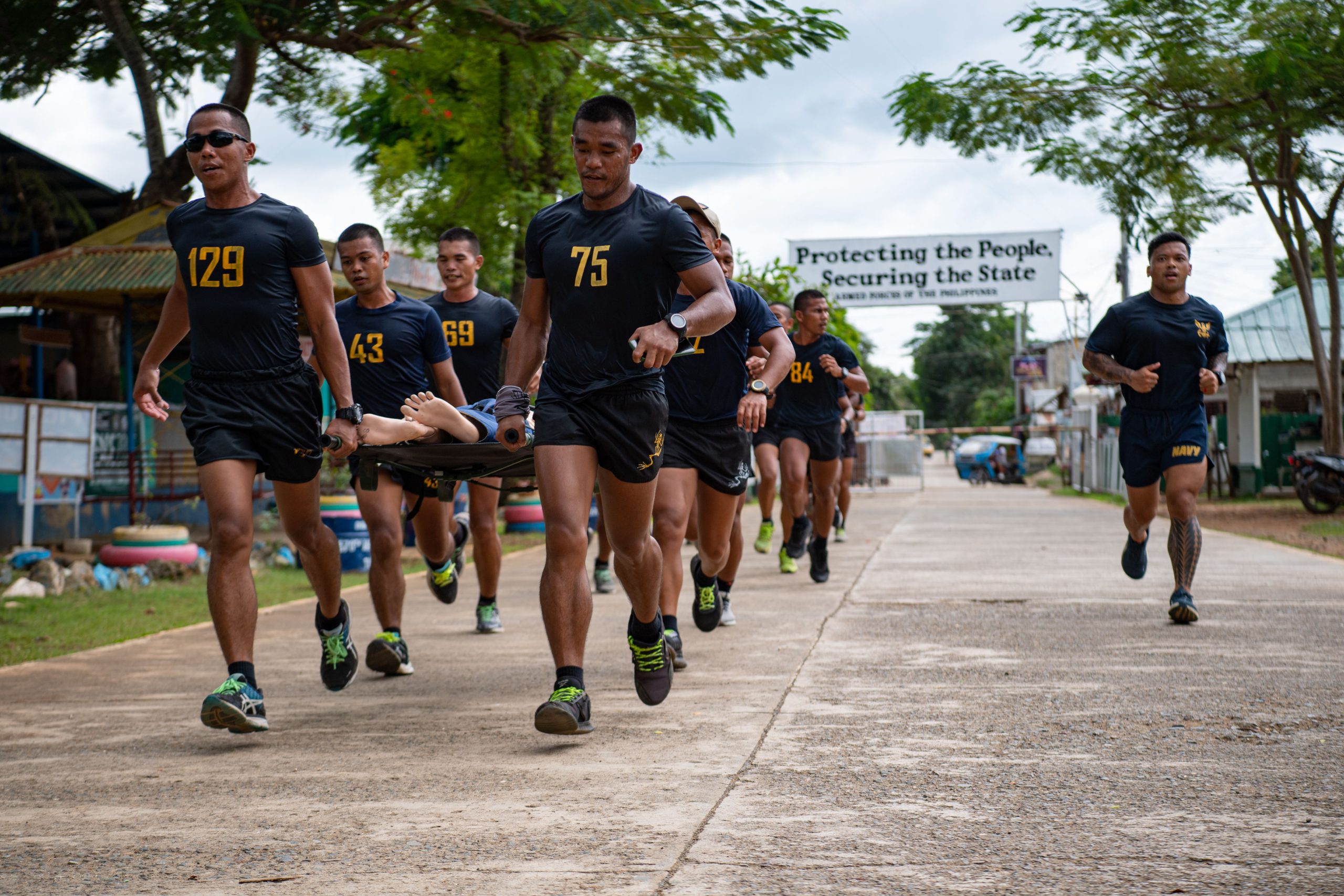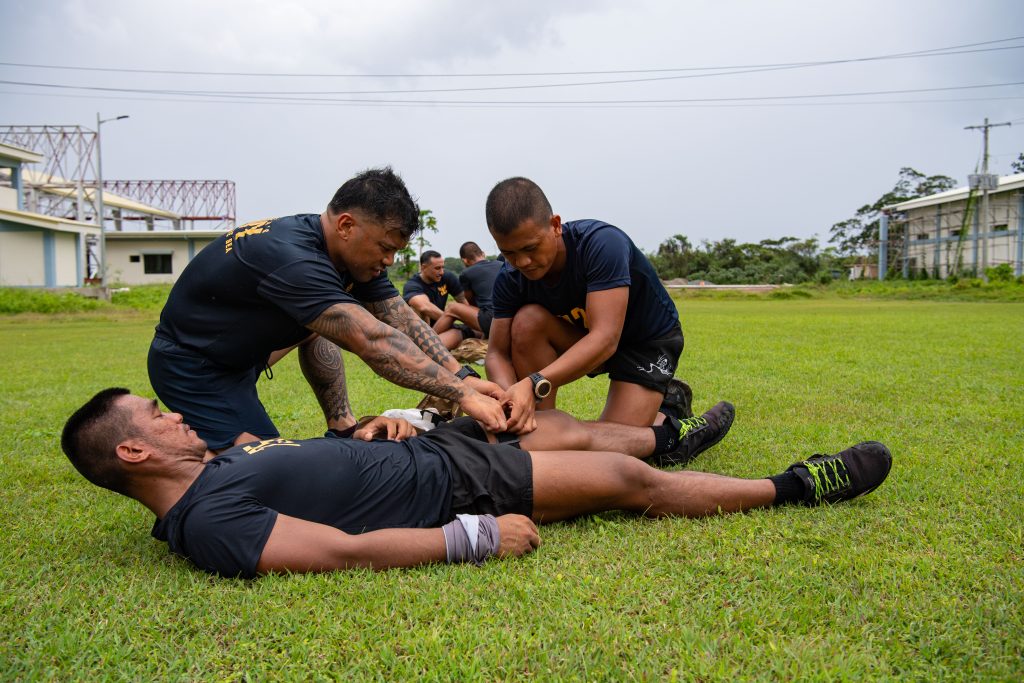
By Bryan “Yogi” Berletch
Brutal is a term thrown around a lot. There are brutal PT sessions, brutal deployments and brutal drill instructors. If there were one thing brutal about the Philippines, I’d say it was the humidity. My buddy Koa and I would wake up around 0500 and catch a water taxi into town every morning. From there, we would have our driver take us to a little bakery nearby for fresh pandesal with cheese. Already starting to drip with sweat in our uniforms, we would order around forty rolls each morning, knowing by the end of it that the crew we were training would get through them all.
Admittedly, this was my first time in the Philippines. Words like “sisig” and “halo-halo” were deliciously foreign to me. “Tubig” was an American joke to remind us to drink enough water. Koa was born and raised in Cebu City, though, so this was a return to a culture that he had left behind as a child. The happiness and pride showed on his face constantly. So we would wait outside the bakery every morning and order fresh pandesal. It wasn’t a part of our mission or because we were trying to “win the hearts and minds” of the men we were instructing. It was simply the kind of hospitality you showed. Filipino hospitality.
We had probably been about three months in at this point in the deployment. Like any other deployment I had been on, downtime was spent working out. I was an avid reader and never turned down the opportunity to meet on the mess deck to hang out with the crew but I belonged in the gym. I was getting really good at it, too. I was hitting new personal records and finding creativity with my programming out of necessity (the risk is higher than the reward for those squat PRs while the ship is rocking back and forth). In other words, I was in the best shape of my life by the time we arrived in the Philippines. I was ready to tackle this instruction with newfound energy and vitality.
I was also very, very wrong.
“Let’s go to the base, have a nice pandesal, and wait for this all to blow over”
We were there to instruct segments of the Philippine military and emergency response forces in the nature and process of our Tactical Combat Casualty Training (TCCC). The course consisted of the usual didactic presentation, followed my practical skills assessment and of course, plenty of physical training. We taught the Philippine Navy, Coast Guard, Marines and Fire Response Units for the first few classes. They were always respectful and willing to learn in a way I think is sometimes missing in our service. We had fun with our time instructing but would ultimately move on to the next class. It was business as usual for us and we were effecting change in a country that was eager and ready to learn.
Then something unexpected happened.
We received word that the next few courses had not been planned on the books. Because our host nation had been so pleased with the TCCC instruction, the powers that be were sending their special forces candidates not only to learn from us but to become instructors in their own right. To become force multipliers and pay the knowledge forward, changing how SF in the Philippines operates and given their extremely limited supplies. This also gave myself and the other instructors a sense of excitement for what we were about to do. We weren’t just there for them to data dump the information later. We were actually changing the standard operating procedure for an allied military force and it felt good to make that kind of impact.
“Up in the morning with that Palawan sun”
The first thing I noticed about the SF class was their smiles. They were all just so eager to be there. Eager for the upcoming challenge and a chance to learn. The next was just how young they all were. At this point, Koa and I had been in the Navy for a minute. In a way, it reminded us of how we used to be. Bright-eyed and invincible, they took to the didactics like sponges. There was no complaining about the PowerPoints or the humidity. They ripped open their bags of pandesal and were actually excited to learn something new.
There was also something to be said about how thin they all were. At first glance, Koa and I were just bigger specimens. Years of weight training and an abundant American diet had turned us into Clydesdales by comparison. They didn’t have access to traditional gym setups and we quickly started debating their physical capabilities. It’s easy to judge books by their covers, I suppose. Little flashes of what was ahead came in the form of questions like, “How far do you go when you run?” with the answer being “As long as the instructor takes us.” Calisthenics and conditioning were never measured in reps and sets but in “hours”.
We set out to PT them as usual and recognized quickly the type of men we were dealing with. That Clydesdale mentality wasn’t working out for me during litter carry runs, where they would strap one of their own in as we carried them through the streets of the city. I can’t remember a single one of them quitting an evolution during our training, ever. We shared cadences as we ran and they shared their smiles with the locals up and down the streets. The children would hear the cadences from a mile away and line their homes cheering for them. Some would even try to run alongside, barefoot for as long as they could keep up.
“These are the people you are here to protect!,” Koa would yell at the top of his lungs, struggling alongside me but always maintaining that composure. “Take a look at their faces! Take a look at your city! This is why you are here! This is why we train!”
More smiles this time and cheers from the class. We picked up the pace. Our cadences got louder. We wanted the whole city to wake up.
It would (thankfully) start raining fairly often during our PT sessions. We would run in the rain until the steam began to rise off of the buzzed heads of the SF candidates. Their litter drills continued until we found ourselves lost in overgrown jungle that ate its way into the city and the base. Then we ran some more.
I specifically remember one of the members of the course was chewing on some tobacco leaves during all of our runs and calisthenics. We were trying to grind them into the dirt and here he was, smiling as always with leaves in his teeth and training like there was no tomorrow. Naturally, I asked him about it and he replied in broken English “It makes you powerful!” So he gave me a pinch that I stuffed into my gums and ran on, more powerful for having shared that moment with a new friend.

“We’re not building relations, Yogi. We’re forging relationships.”
The instructors, Koa and myself would finish each class by inviting them out to this little pool hall in the middle of the city. For groups of twenty or so men, we would treat them to all they could eat and all they could drink to congratulate them on a class completed. They repaid us by schooling us in billiards. If these boys could shoot on the range the same way they shot pool, I could only hope they would be ok when they deployed to their respective combat zones in a few weeks.
I traded my Garmin watch for a couple of patches. A pair of Bates boots for a few more. We were invited back to their compound for dinner and beer. I learned how to scuba dive for the first time in the murky waters near our ported ship because they just wanted to see me do it. I managed to give them a run for their money with a karaoke run of Third Eye Blind songs that made them sing along, not knowing the words but having the time of their lives regardless. Hell, they even gave me a puppy that their base dog had recently given birth to (I politely declined, as a ship is no place to raise a dog that hasn’t even opened its eyes).
All of my experiences with these gentlemen were transformative to say the least. Much like the old adage of “eat your vegetables because there are starving children in the world” that my mother used to tell me, there was little for me to connect the two points. Here in this small part of the world, were operators with next to nothing in terms of supplies and up-to-date training. There weren’t state-of-the-art gyms for lifting and getting stronger – there were only more brutal hours on the calisthenic routine. There was no Garmin-tracked run for maximum efficiency – only the brutal slap of shoes in the mud between singing cadences. They exemplified everything about individuals with next to nothing but giving everything in the pursuit of their excellence. As with everything they did, they did it with a smile on their face.
In between all of this though, I would be remiss not to tell the story about the effect this had on Koa. The man found his heritage again in a place he least expected it. He told me one night that he had his initial reservations on his return to the home he had left as a child. How he had managed to build up an entire life from leaving and joining the military, forging his own path and leaving this world behind. There’s something to be said about watching someone connect with their sense of pride in where they came from. You don’t always have to leave the past behind. That sometimes, you can find a way to connect yourself with the beauty and brutality of it all.
It’s an aspect of the military I faced in my own training early on but it’s easy to forget sometimes. I think we all could use that reminder of what it is like for renewed passion in your profession. Of what it’s like to do something truly amazing with next to nothing. What it means to be suffering in the moment but building relationships with those to our left and right. What it means to take those relationships beyond the training and form real friendships outside of work. And for what it means to reconnect with a past you had long since forgotten.
Bryan is an active-duty US Navy Corpsman.
